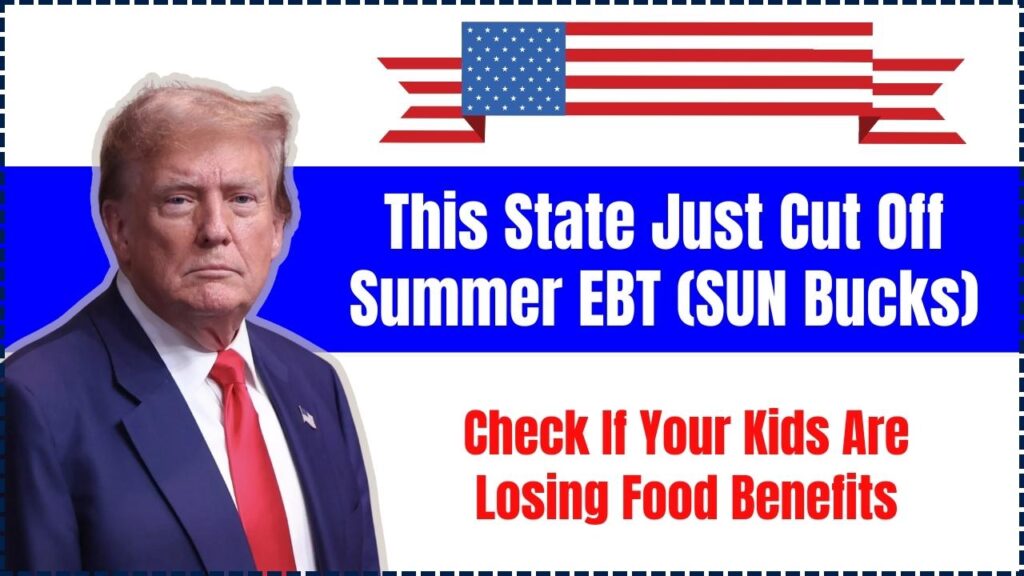Cut Off Summer EBT (SUN Bucks) in 2025: The Summer Electronic Benefit Transfer (EBT) program, often called SUN Bucks, plays a vital role in helping families put food on the table during the summer months. Specifically designed for low-income households whose children receive free or reduced-price school meals, this program provides funds to cover groceries when schools are closed. However, Tennessee recently announced it will discontinue the program in 2025, raising questions about what this means for affected families and how they can navigate the change.

What Is the Summer EBT (SUN Bucks) Program?
The Summer EBT program began as a federal initiative to combat childhood food insecurity during the summer. When schools close, millions of children lose access to daily meals, putting them at risk of hunger. SUN Bucks fills this gap by providing eligible families with an EBT card loaded with approximately $120 per child, which can be used to buy food at participating retailers.
Since its inception, the program has expanded across multiple states, helping over 1 million children nationally during summer breaks. The USDA funds and oversees the program in partnership with state agencies, aiming to ensure that children do not go hungry during the critical summer months.
Why Is Tennessee Ending the Program?
As of 2025, Tennessee has opted to withdraw from the federal Summer EBT program, choosing instead to run its own state-led summer food initiatives. According to the Tennessee Department of Human Services (DHS), this change is intended to provide more localized control and efficiency in distributing summer food assistance.
However, critics argue this shift will reduce the reach and impact of food aid. The federal program supported approximately 700,000 children in Tennessee last year, while state programs plan to serve only around 25,000. This dramatic reduction raises concerns about increased food insecurity among vulnerable children.
Cut Off Summer EBT (SUN Bucks) in 2025
| Feature | Details |
|---|---|
| Program Name | Summer Electronic Benefit Transfer (EBT) or SUN Bucks |
| State Impacted | Tennessee (opt-out starting 2025) |
| Benefit Amount | $120 per eligible child |
| Eligibility | Low-income families with children receiving free or reduced-price school meals |
| National Impact | Over 1 million children served in 2024 |
| Alternatives Available | State-run programs, local food banks, summer meal sites |
| Official Resource | USDA Summer EBT Program |
The discontinuation of Tennessee’s participation in the Summer EBT (SUN Bucks) program in 2025 represents a significant shift in how summer food assistance is provided. While state programs and community initiatives will offer some support, many families risk losing critical food aid. Understanding the changes, exploring alternative resources, and advocating for expanded support are essential steps for affected families.
Understanding Food Insecurity and Why Summer EBT Matters
According to the USDA Economic Research Service, in 2023, roughly 13.5 million children in the U.S. lived in food-insecure households. Research shows food insecurity spikes during summer months when school meals are unavailable.
States that continue to participate in the Summer EBT program report lower rates of food insecurity among children in summer compared to those without the program. A 2022 USDA report found that children in participating states were 25% less likely to experience hunger during summer months.
What Happens to Families Without SUN Bucks?
Families losing access to SUN Bucks in Tennessee face tough choices, especially when budgets are already tight. Food costs have risen dramatically in recent years — the USDA reports a 12% increase in grocery prices in 2024 alone. Without additional food assistance, many families might struggle to provide adequate meals.
Alternative Food Assistance Options for Tennessee Families
1. State-Run Summer Food Programs
Tennessee plans to serve 25,000 children with state-funded summer meal programs. However, these often require children to attend specific meal sites to receive free food, which can be a challenge for working parents without transportation.
2. Community-Based Meal Programs
Nonprofits and local community organizations run summer feeding sites offering free meals. Parents can check local libraries, community centers, and places of worship for summer food programs.
3. Food Banks and Pantries
Food banks often increase distributions during summer months. Families can visit organizations such as Feeding America to find a local food bank.
4. Other Federal Nutrition Programs
Families should also explore eligibility for Supplemental Nutrition Assistance Program (SNAP) and Women, Infants, and Children (WIC) programs, which provide year-round food assistance.
Guide to Access Summer Food Assistance
- Confirm Eligibility: Families with children who received free or reduced-price meals during the school year are generally eligible.
- Check Local Resources: Visit your school district’s website or contact the DHS to learn about available programs.
- Apply Early: State and community programs may have limited spots; apply or register as soon as possible.
- Use Meal Sites: Find local summer meal locations via USDA’s Summer Food Service Program locator.
- Supplement with Food Banks: Locate nearby food pantries for additional support.
Expert Opinions and Advocacy
Dr. Karen Shields, a childhood nutrition expert, says:
“The Summer EBT program has been a crucial safety net. Without it, children risk nutritional gaps that can affect their health and learning readiness when school resumes.”
The Food Research & Action Center (FRAC) advocates for expanding Summer EBT nationwide, calling it “one of the most effective tools to fight summer hunger.”
Tips for Budgeting Food During Summer
- Plan meals and snacks: Focus on nutrient-dense foods that are cost-effective.
- Buy in bulk: Look for deals on staples like rice, beans, and canned vegetables.
- Cook at home: Prepare meals from scratch to save money.
- Use coupons and apps: Take advantage of grocery store discounts and rebate apps.
FAQs On Cut Off Summer EBT (SUN Bucks) in 2025
What is the Summer EBT program?
It’s a federal program that gives families funds to buy groceries during summer when school meals aren’t available.
Why did Tennessee opt out of the program?
To create their own state-specific programs, aiming for more local control, though this means fewer children will be served.
How can I find out if my child is affected?
Contact your school district or Tennessee DHS to check if you’re enrolled or eligible for alternative programs.
Are there other programs that can help?
Yes, SNAP, WIC, local food banks, and summer meal sites are all resources families can tap into.
The Road Ahead: Policy and Advocacy
With rising food insecurity nationwide, many advocates urge Congress to expand funding for Summer EBT and make it available in all states. Families and community organizations are encouraged to raise their voices and advocate for policies that protect children from hunger year-round.






